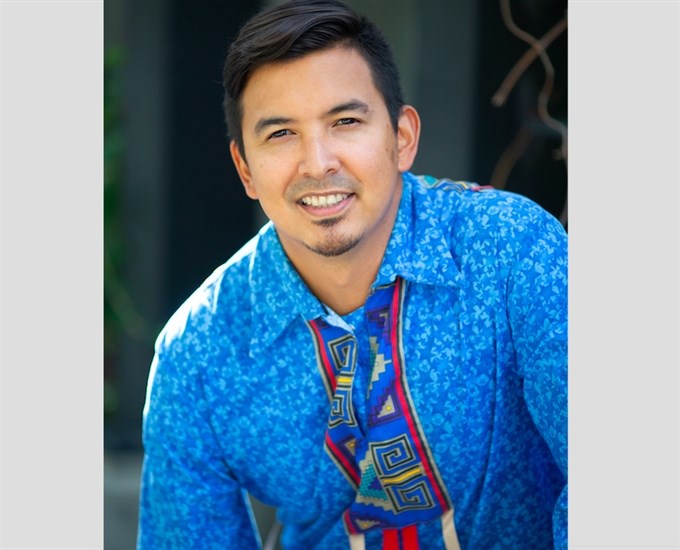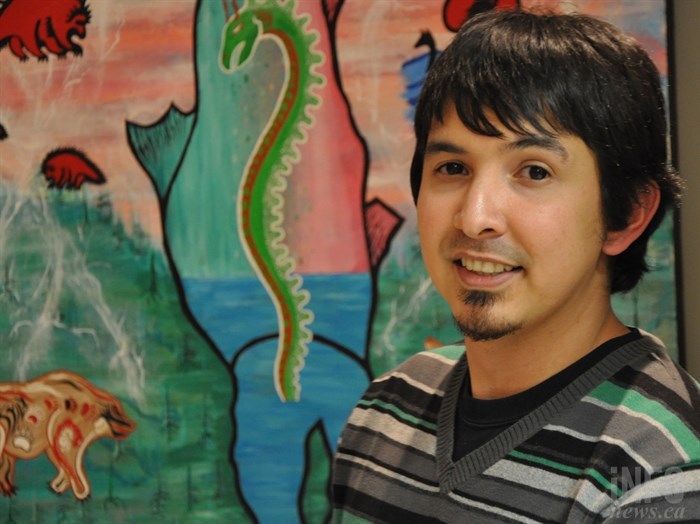
Jordan Coble is the Westbank First Nation appointee to the Regional District of the Central Okanagan board.
Image Credit: Submitted/Darren Hull
December 04, 2019 - 7:00 AM
Jordan Coble is the newest member of the board for the Regional District of the Central Okanagan, joining it earlier this fall after being elected to the Westbank First Nation council in September.
He feels connected to all the land within the regional district. After all, it’s all within the traditional unceded territory of his people.
But, if an issue comes down to the crunch, he can speak all he wants but he cannot vote.
“That was my first question that I had to a number of people here: How do I create change, knowing there are limitations and I’m not able to vote?” he told iNFOnews.ca. “Everybody at that table is very quick to remind me that I have a strong influence, which is all well and fine. I’m never shy to share my thoughts and opinions and stories with anyone that’s willing to listen. But, at the same time, that’s a flawed system. You can’t have someone sitting at that table without empowering that person with at least casting a vote, especially when they’re contributing funds to the same degree as everyone else.”
With about 9,000 people living on Westbank First Nation land, he represents almost 2.5 times as many people as the Ellison/Joe Rich director and 1.7 times as many as Peachland. But each jurisdiction pays for different services so, for example, Ellison/Joe Rich pays more in total than Westbank First Nation.
Coble is quick to point out that this “flawed system” is not the fault of this regional board.
In fact, he said, having a First Nation person with a seat at a regional district table is unique to the Central Okanagan in B.C.
The fault lies with the fact the regional districts are a provincial creation that recognize municipalities and unincorporated areas – not something that’s under federal jurisdiction.
Coble, at 36, may also be the youngest member of the board.
He gave up his position as manager of the Sncewips Heritage Museum after being elected – a position that he fell into almost accidentally.
Born and raised in Westbank, he freely admits he was an angry young man who didn’t take kindly to being told what to do.
“I always had a pretty decent head on my shoulders and I valued what education could provide,” he said. “My issue with high school was that it wasn’t a very healthy space for First Nations people. It wasn’t the students at the school or the staff at the school, for the most part. It was the content. It was boring to me. It wasn’t challenging. It wasn’t insightful. It seemed so redundant.”
So, when an elder who was a band council member told him to get educated, that didn’t sit well with him.
“Being the stubborn young man I was, I didn’t receive that conversation as well as I probably should have,” he said. “But, (after travelling for some time) it ended up in me going back to university, so it ended up being one of the more meaningful conversations I’ve ever had.”
At UBCO, he earned a Bachelor’s degree in Critical Studies with a focus on cultural studies.
“I loved my experience there,” he said. “I wanted to be accountable to a community that was funding my education. But, also knowing I’m representing first nations people, whether I know it or not, every one of those classes made me feel an extra sense of pride and accountability to make sure whatever I said in those discussions was beneficial to the conversation.”
It was at one of his final classes there that he was turned off to the idea of ever working in a museum because of the way they depicted Indigenous history.
As he was walking from that class to his car, he got a phone call asking him to help create the Sncewips Heritage Museum.
“I said, I’m more than happy to do this if we make it a living museum, if we can rewrite how museums write about Indigenous peoples,” he said. “If we can make a living museum that acknowledges that we’re still here, that we still speak our language, that we still have a culture and cherish that it’s both a mixture of our traditional culture and the borrowed culture that’s borrowed from many other cultures then, ya, I’m on board.”

Jordan Coble at the Sncawips Heritage Museum in 2016.
(MARSHALL JONES / iNFOnews.ca)
What he means by a “living museum” is something that not only shows items from the past, but brings them to life as part of the present and the future.
“We talk about how those benefit our contemporary present and will, hopefully, be of benefit to us moving forward, representing the values that make our culture,” he said. “It’s not the item we’re celebrating. It’s the art of perfecting that cultural practice that makes us what we are today.”
And, to Coble, language is an integral part of his cultural makeup.
“I get a lot of questions from teachers who want translations into their schools,” he said. “They want to know the word for fox or the word for bear or some welcoming statement. So I explain to them that I can translate the words for you, that’s not a problem. But what I can’t translate is the meaning, the feeling, the emotion of that language. It can’t be translated into English.”
Even the name of the language – nsyilxan – is not a name, but a phrase meaning, essentially “everything that’s combined from within you coming out the mouth.”
That’s the cultural perspective Coble takes when he sits at the regional district - or any other table.
“Whenever I walk into a space, I check my ego at the door,” he said. “I check my biases at the door. When I speak at those tables, I speak on behalf of Westbank First Nation. So, whether I speak on an issue connected to Peachland or West Kelowna or the City of Kelowna – sorry everybody, but you’re on our traditional unceded traditional territory - so I have input to provide, regardless of the topic. Sometimes I speak up but other times I sit back and listen because I don’t think politicians listen enough.
“I sit on that board because any thing, any body, any piece of land, is still within my traditional territory so I have a responsibility on behalf of, not just the members I represent from Westbank First Nations, but my ancestors, my members that belong to the rest of the nation, to speak up if it’s affecting our lands and our people and our waters.”
To contact a reporter for this story, email Rob Munro or call 250-808-0143 or email the editor. You can also submit photos, videos or news tips to the newsroom and be entered to win a monthly prize draw.
We welcome your comments and opinions on our stories but play nice. We won't censor or delete comments unless they contain off-topic statements or links, unnecessary vulgarity, false facts, spam or obviously fake profiles. If you have any concerns about what you see in comments, email the editor in the link above.
News from © iNFOnews, 2019